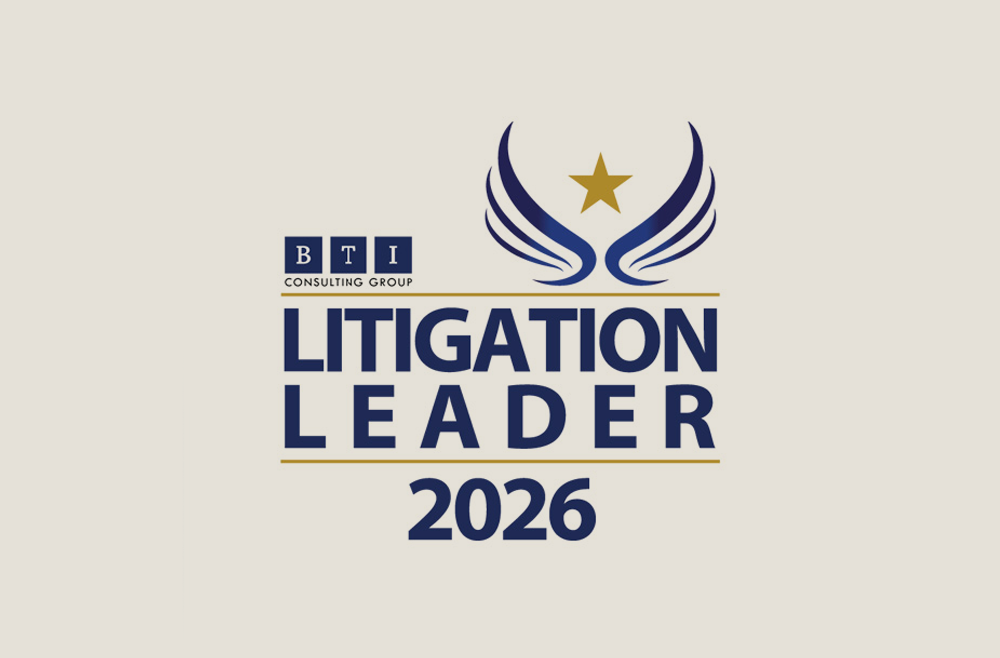National Retail Newsletter - September 2014 Edition
Hinshaw Newsletter | 9 min read
Sep 9, 2014
- Retail Establishments Are Not Required to Provide Wheelchairs or Motorized Scooters For Patrons
- Non-Delegable Duty For Premises Owners
- Trip-And-Fall on Property Lease
- Florida's Fourth District Court Appeals Continues to Expand Bias Discovery
- Business Suspecting Fake Service Dog Must Stay Within Limits
Retail Establishments Are Not Required to Provide Wheelchairs or Motorized Scooters For Patrons
With the upsurge in recent years of lawsuits brought for alleged violations of the Americans with Disabilities Act (ADA), establishments have had to remain hypervigilant to ensure compliance with the ADA's plethora of accessibility requirements.
Title III of the ADA, was enacted by the United States Congress in 1990 (42 U.S.C. § 12181 et seq.,) and prohibits businesses open to the public from discriminating against persons because of their disabilities. Discrimination under the ADA is essentially defined as a failure to make reasonable modifications in policies, practices, or procedures, when such modifications are necessary to afford goods, services, privileges, advantages, or accommodations to individuals with disabilities.
Among other requirements, the ADA, which contains a private right of action for both individuals and advocacy groups, requires removal of structural barriers in public accommodations "where such removal is readily achievable.” Where barrier removal is not readily achievable, access must be provided “through alternative methods if such methods are readily achievable." Individuals with qualified disabilities may institute a private lawsuit in order to enforce the ADA requirements, which could entitle them to injunctive relief as well as an award of their attorneys' fees.
Under the ADA, a qualified individual with a disability is not entitled to the accommodation of their choice but only to a reasonable accommodation. A modification is not required under the ADA unless it is "necessary to afford access” to the public accommodation. The Supreme Court has held that a modification is not “necessary" even where access to the public accommodation may be "uncomfortable or difficult" without it.
Regulations promulgated by the United States Department of Justice have made clear that public accommodations are not required to provide personal devices such as wheelchairs, individually prescribed devices including prescription eyeglasses or hearing aids, or services of a personal nature including assistance in eating, toileting, or dressing.
Disabled individuals use a variety of devices for mobility including walkers, canes, crutches or braces, and manually-operated or power wheelchairs. While businesses do not need to provide these devices, individuals with disabilities must be allowed to use these devices in all areas where customers are allowed to go.
http://www.ada.gov/pubs/ada.htm
For further information on ADA rules and requirements or questions regarding your facilities compliance, please contact your Hinshaw attorney.
Non-Delegable Duty For Premises Owners
Florida, and many other states, provide for a premises owners liability to include non-delegable duties. These are duties or standards that may be contracted to be carried out by others, but the potential liability for the duties or standards remains with the premises owner. Specifically, the duty to maintain and keep a premises safe, in all respects, including attack by third persons, is a duty that remains with the premises owner.
Retail establishments which own its building and business premises are susceptible to additional avenues of plaintiff recovery and increased exposure of damages. Tenants or contractors may help defray the exposure, but ultimately, the premises owner is responsible. A non-delegable duty may be delegated, but may only be delegated if the duty was performed non-negligently, which while obvious, is well stated law. Florida re-examined this non-delegable duty most recently in Pembroke Lakes Mall ltd. v. McGruder, 137 So.3d 418 (Fla. 4th DCA 2014).
In McGruder, a mall patron brought a claim against the premises owner, Pembroke Lakes Mall and the contracted cleaning service Millard, for a slip and fall incident. Without reviewing the contract or potential indemnification issues, the court found Pembroke Lakes Mall to have a statutory non-delegable duty to maintain a safe premises free of transitory foreign substances pursuant to Florida Statute §768.0710. The statutory non-delegable duty moniker should make no difference since the non-delegable duty existed long before there was a statute requiring premises owners of the same. Once the jury found both Millard and Pembroke Lakes Mall to be negligent, the apportionment of fault was applied. Each party was found to be 50% liable. However, the appellate court took it a step further and determined that the non-delegable duty aspect of the claim created joint and several liability for the 50% attributed to Millard. As such, Pembroke Lakes Mall was responsible for the entire judgment. This was just a recitation of long standing principles of Florida law, similar throughout the nation.
The significance in its reiteration, however, is that this recitation brings back to the forefront the significance of the non-delegable duty to the premises owner. A gentle reminder that the premises owner does not enjoy apportionment from its contractor or tenant. A significant concept in Florida since joint and several liability was abrogated by statute in 2006.
Pembroke Lakes Mall ltd. v. McGruder, 137 So.3d 418 (Fla. 4th DCA 2014)
For further information on the significance of non-delegable duties or questions regarding your business premises, please contact your Hinshaw Attorney.
Trip-and-Fall on Property Lease
In 1995 Houston's purchased and developed a 10 acre piece of property in South Florida with the plan to construct three restaurants on the site. Houston's built it's own restaurant on one site, sold a second site, and leased the third site to P.F. Chang's. The property was turned over to P.F. Chang's in 1997 by Houston's pursuant to the terms and conditions of the lease.
The Plaintiff in the underlying lawsuit fell and injured herself on her way into the P.F. Chang's restaurant in December of 2006. She sued both P.F. Chang's and Houston's. P.F. Chang's made the demand that Houston's defend and indemnify P.F. Chang's for the claims brought in the lawsuit. Houston's refused. P.F. Chang's then settled the underlying lawsuit and sued Houston's.
At competing Summary Judgment motions below, the trial judge granted P.F. Chang's Motion for Summary Judgment, and denied Houston's Motion for Summary Judgment. An appeal ensued.
This decision holds that the fall and injury to the Plaintiff occurred on the "Premises" as defined in the lease, which differed from what P.F. Chang's argued were its premises. As such, Houston's did not have the duty to defend and indemnify P.F. Changs for the Plaintiff's injuries and damages alleged in the underlying suit, along with the costs and fees associated with the defense of that lawsuit. The decision further holds that in this situation, P.F. Chang's had the duty to indemnify Houston's, and as such, it reversed the award to P.F. Chang's, and directed the trial judge to enter judgment on behalf of Houston's.
For more information, please contact James H. Wyman.
Florida's Fourth District Court of Appeals Continues to Expand Bias Discovery
Florida's Fourth District Court of Appeals continues to expand bias discovery. Specifically, in Brown v. Mittelman, opinion dated August 27, 2014, a treating physician for a plaintiff in an automobile accident suit attempted to quash a discovery order permitting discovery into the existence of a relationship with plaintiff's counsel. The automobile accident defendant sought to obtain documents from the treating physician via subpoena related to personal injury patients previously represented by the plaintiff law firm, letters of protection, and direct referral from plaintiff firms. The treating physician objected to the subpoena, which was overruled and the discovery granted. The treating physician appealed the decision. The Fourth DCA found that the type of information requested was a source of bias discovery that may not be immediately or readily apparent to a jury. The lack of express lawyer referral to physician makes no difference to the discussion for this discovery. In fact, the Fourth DCA expressly stated that any earlier opinions in that regard, was an unintended limitation. Therefore, consistent with this opinion, so long as the discovery seeks to uncover an ongoing relationship, is limited in time/scope, and not overly intrusive, the trial courts are within their discretion to permit the discovery.
Brown v. Mittelman, No. 4D14-1748 (Fla. 4th DCA August 27, 2014)
For further information, please contact your Hinshaw Attorney.
The following article was published June 25, 2014 in the Daily Business Review.
Business Suspecting Fake Service Dog Must Stay Within Limits
A recent trend in litigation associated with the Americans with Disabilities Act (ADA) is by those with service dogs entering places of public accommodation. Under the ADA, State and local governments, business, and nonprofit organizations that serve the public generally must allow service animals to accompany people with disabilities in all areas of the facility where the public is normally allowed to go. Businesses that do not know or understand the rules associated with this Act may be susceptible to litigation in this regard. While the ADA does not allow for plaintiffs who sue privately to obtain money damages, a plaintiff can recover attorney fees which can be costly for a business. Moreover, compensatory damages can be awarded to a plaintiff if the Department of Justice sues as a result of a person with a disability's complaint for failure to comply with the ADA. Therefore it is important for a business to understand how to enact its policies and train its employees to ensure compliance with the ADA and avoid litigation.
Under the ADA, service animals are defined as dogs that are individually trained to do work or perform tasks for people with disabilities, including a physical, sensory, psychiatric, intellectual or other mental disability. (While service animal has been primarily defined as dogs, there is a separate provision under the Act regarding miniature horses that have been individually trained to do work or perform tasks for people with disabilities.) The task performed by the dog must be directly related to the person's disability. The only established training requirements for a service animal are those listed in the definition above and that the service animal must be trained to behave properly in places of public accommodation, However, there is no requirement that the dog be licensed or certified by a state or local government to qualify. The service animals must be harnessed, leashed or tethered unless these devices interfere with the service animal's work or the individual's disability prevents using these devices. In those situations, the individual must maintain control of the animal through other effective controls.
Another growing complaint is when an individual claims his or her pet is a service animal when the individual is not a protected person under the ADA or his or her pet does not qualify as a service animal under the ADA's definition. While the ADA considers the use of a fake service dog a federal crime, this may be difficult to detect. According to the U.S. Department of Justice, animals are not required to wear any special identification and it is unlawful to require proof of a disability or identification for the service dog. The ADA states that a limited inquiry is allowed when it is not obvious what services an animal provides to its handler.
To be clear, businesses may not ask about the nature or extent of an individual's disability and as discussed above, may not require documentation or proof that an animal has been certified, trained or licensed as a service animal. There are generally two questions that a business may ask of a dog owner: Is the dog required because of a disability? What task or service has the dog been trained to do? The business, however, may not ask the individual to have the dog perform the task or service as proof -- the business must take the answers to these questions at face value. If it is readily apparent that the animal is trained to do work or perform tasks for an individual with a disability, then the above inquires may not be made by the business.
While only limited inquiries may be made by a business if it is not readily apparent that the animal is a service dog, the law does allow for a business to ask an individual with a disability to remove the dog from the premises under certain circumstances. These exceptions are if the animal is out of control and the animal's handler does not take effective action to control it, or the animal is not housebroken. While businesses must allow patron's with disabilities to enter with their service dogs, therapy, comfort or "emotional support animals" do not meet the definition of a service animal. Specifically, the ADA states that the crime deterrent effects of an animal's presence and the provision of emotional support, well-being, comfort or companionship do not constitute work or tasks and as such do not meet the definition of a service animal.
Businesses who are not aware of what is allowed under the ADA may be targeted by individuals with service dogs. There has been an increase in these types of lawsuits where an individual comes in to the business and will attempt to get the business to make an improper inquiry about the dog or their disability in order to file suit. While it may be difficult to spot a "fake" service dog, a business can protect itself from future litigation by training its employees to properly assess the situation and make a limited inquiry of a dog handler, if necessary.
For further information, please contact your Hinshaw Attorney.
This newsletter has been prepared by Hinshaw & Culbertson LLP to provide information on recent legal developments of interest to our readers. It is not intended to provide legal advice for a specific situation or to create an attorney-client relationship.
Related Capabilities
Featured Insights

In The News
Nov 13, 2025
A Profile on Neil Rollnick: After 57 Years in Practice, He Has No Plans to Retire

Press Release
Oct 22, 2025
Hinshaw & Culbertson LLP Launches New Website and Refreshed Brand

Press Release
Sep 26, 2025
Hinshaw Recognized as a “Leader in Litigation” in the BTI Consulting Litigation Outlook 2026 Survey

Privacy, Cyber & AI Decoded Alert
Sep 23, 2025
Fall 2025 Regulatory Roundup: Top U.S. Privacy and AI Developments for Businesses to Track

Press Release
Sep 15, 2025
Hinshaw Achieves 2024–2025 Mansfield Rule Certification Plus Status

In The News
Sep 5, 2025
Jessica Riley Reflects in a Law360 Story on Lessons She Learned as a Junior Lawyer






